Abstract
Nondirectiveness is considered an essential part of genetic counseling, yet there is no generally accepted definition nor data documenting its impact on counselees. This study is an empirical investigation of directiveness, using ratings from transcripts of consultations and comparing these with counselor-reported and counselee-reported directiveness. Rated directiveness was defined as advice, expressed views about or selective reinforcement of counselees' behavior, thoughts, or emotions (advice, evaluation, and reinforcement). Analysis of 131 transcripts revealed a mean of 5.8 advice statements per consultation, 5.8 evaluative statements, and 1.7 reinforcing statements. When asked to describe their counseling style, none of the 11 counselors rated it as "not at all" directive. Half the counselees who faced a decision felt steered by the counselor. Items of rated directiveness showed satisfactory interrater reliability (kappa = .63). Factor analysis revealed that they formed one factor (eigenvalue 1.72). There were no associations either between counselor-reported, counselee-reported, and rated directiveness or between these measures and counselee anxiety and concern, satisfaction with information, or the meeting of counselees' expectations. Rated directiveness was the only measure to be associated with other process measures of the consultation, being associated with longer consultations, more blocks of speech, more social and emotional issues being raised, and fewer concerns being followed up. Advice was more likely to be given to counselees of lower socioeconomic status and to counselees judged by counselors to be highly concerned. Evaluative statements were more likely to be made by counselors who had received counseling training. These results show that genetic counseling was not characterized--by counselors, counselees, or a standardized rating scale--as uniformly nondirective.
Full text
PDF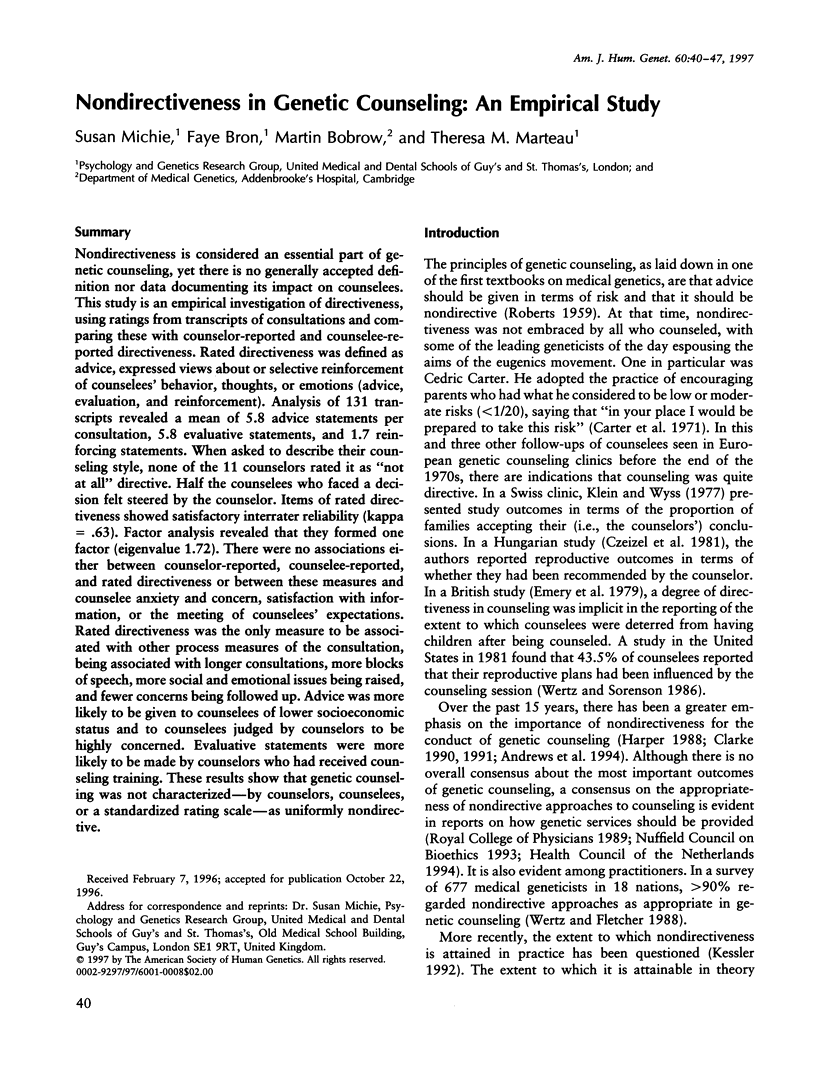
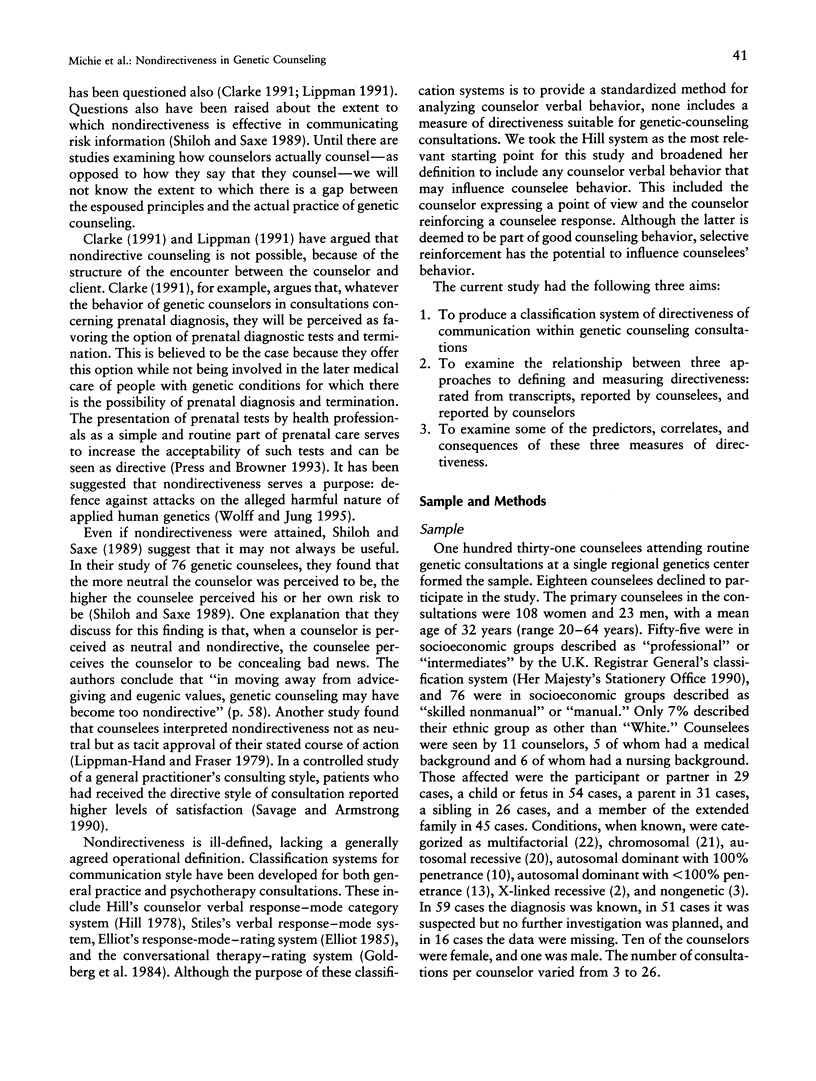
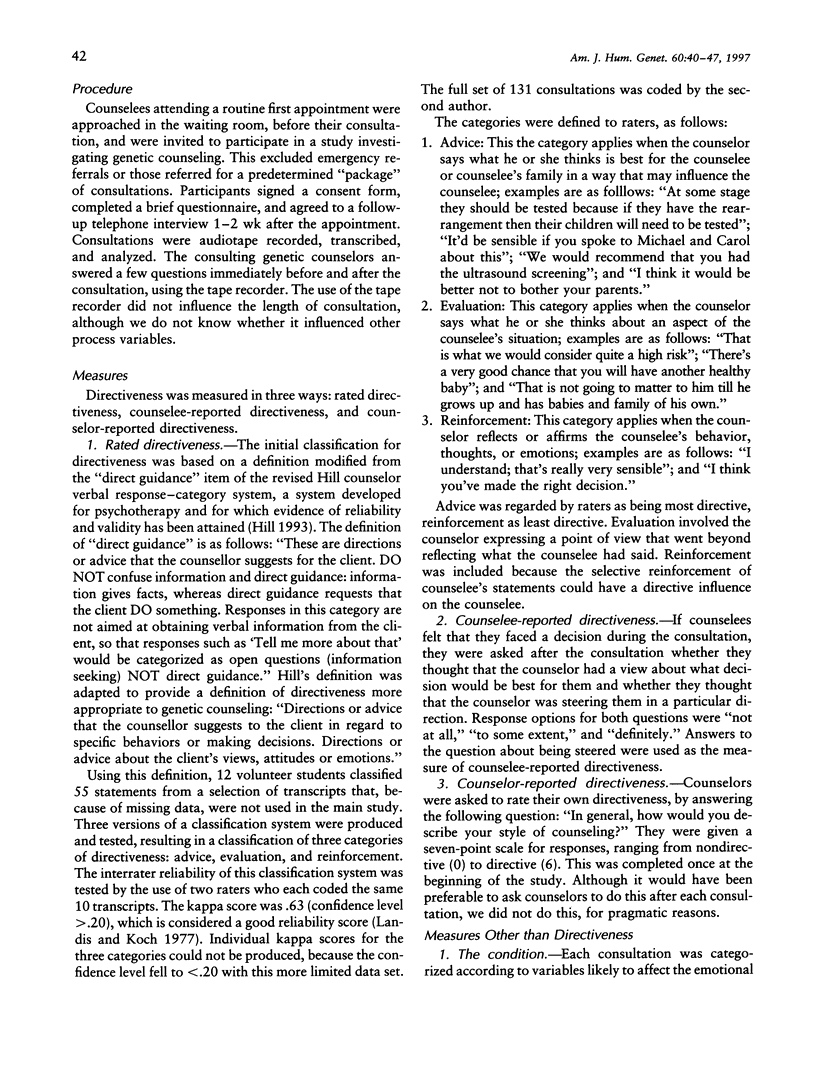
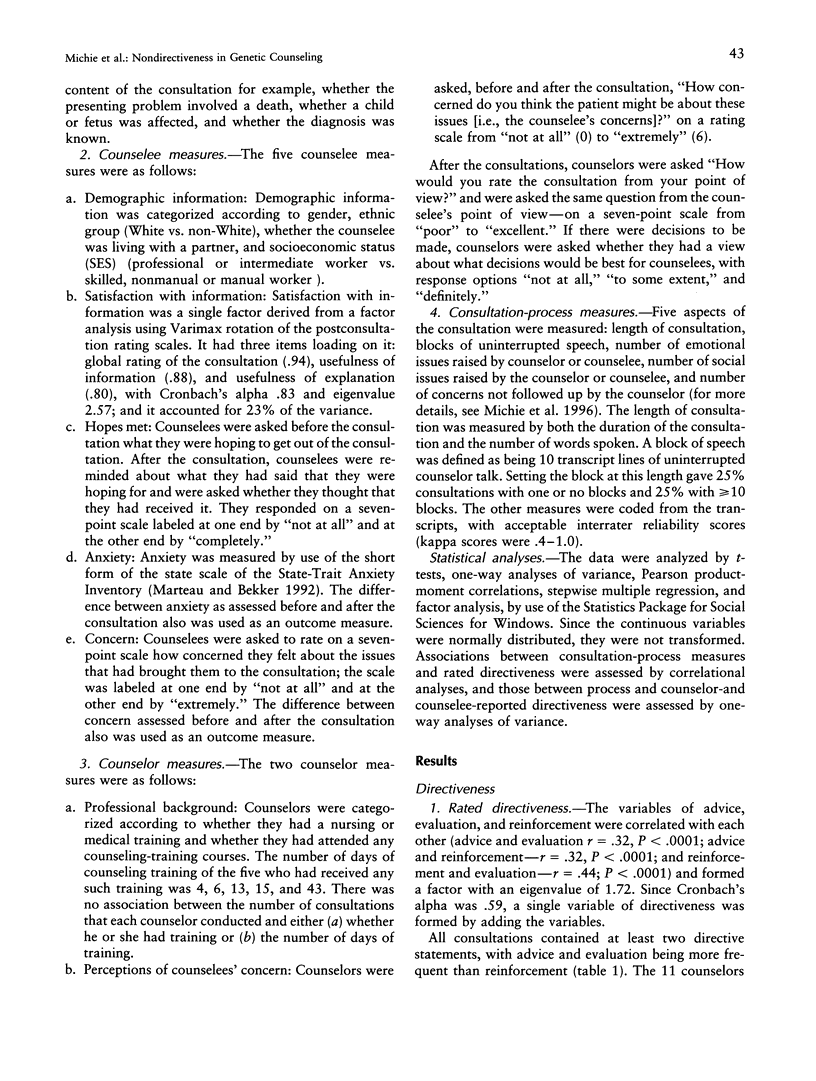
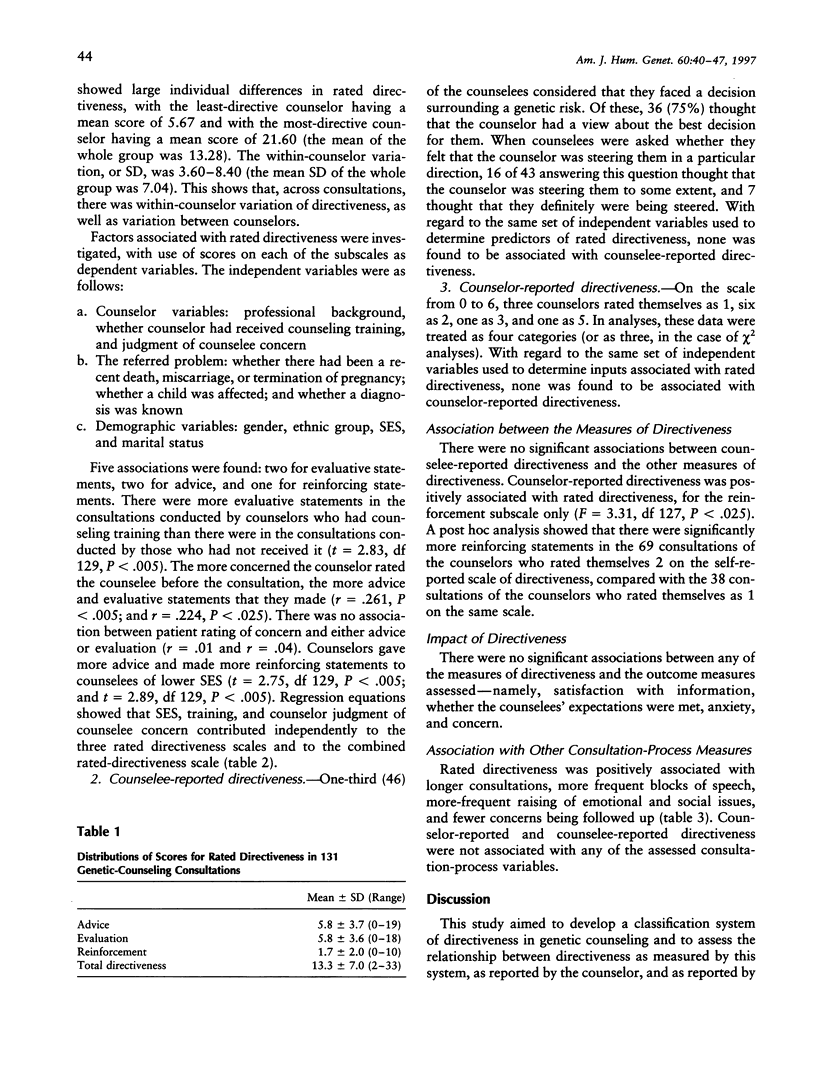
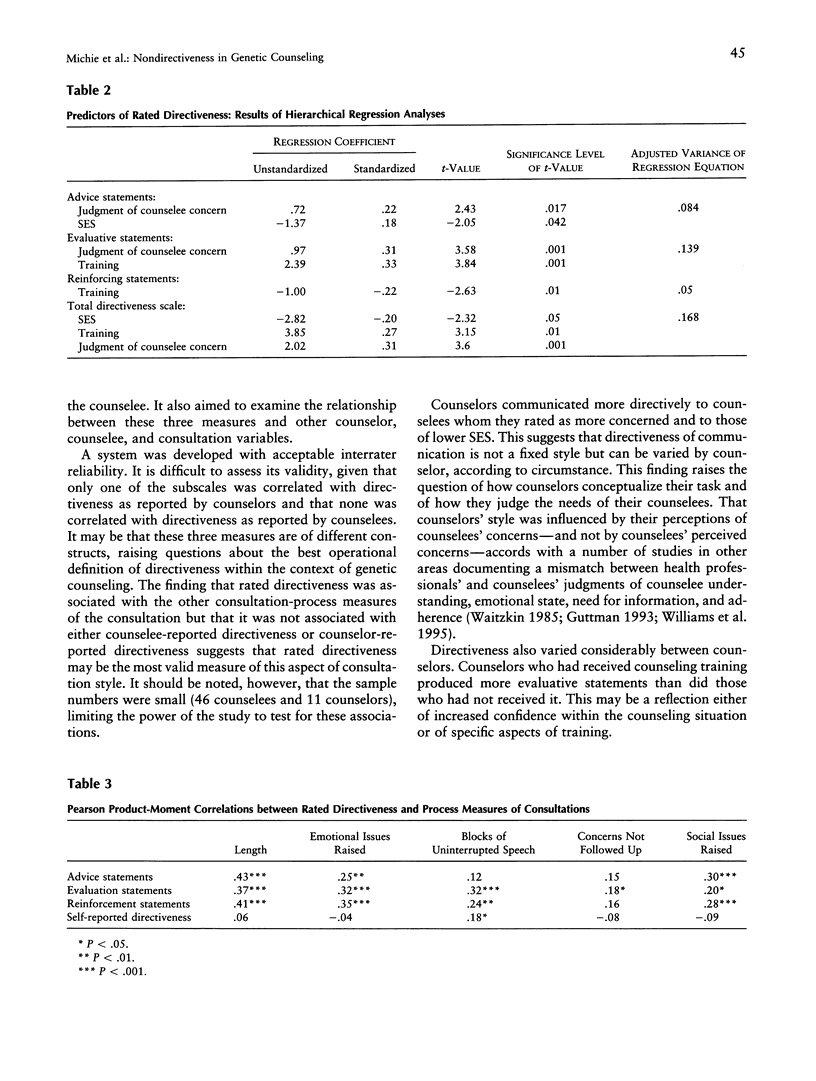
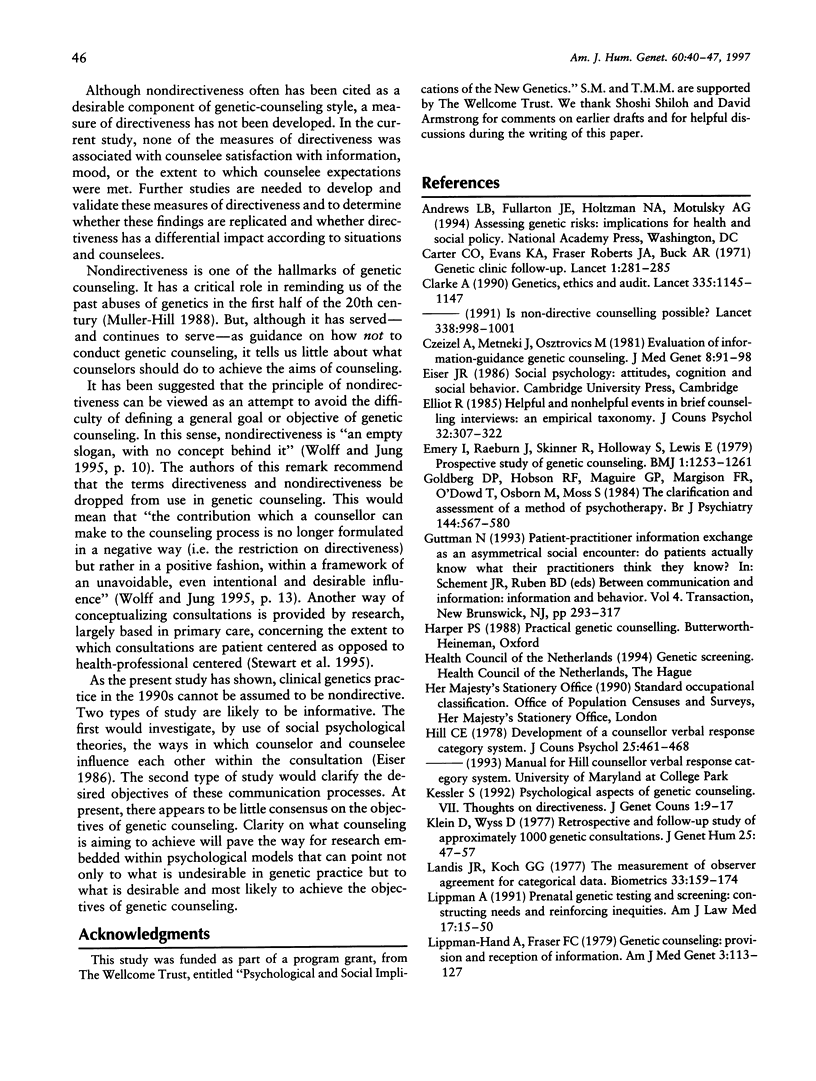
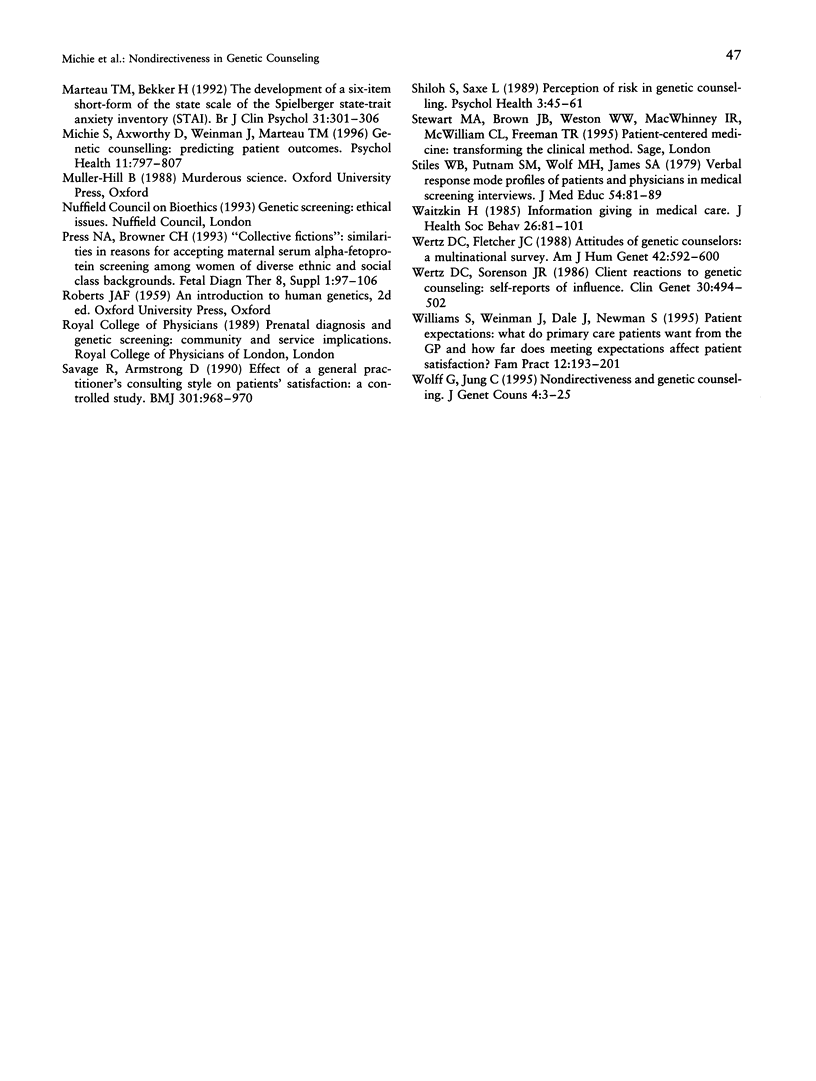
Selected References
These references are in PubMed. This may not be the complete list of references from this article.
- Clarke A. Genetics, ethics, and audit. Lancet. 1990 May 12;335(8698):1145–1147. doi: 10.1016/0140-6736(90)91139-2. [DOI] [PubMed] [Google Scholar]
- Czeizel A., Métneki J., Osztovics M. Evaluation of information-guidance genetic counselling. J Med Genet. 1981 Apr;18(2):91–98. doi: 10.1136/jmg.18.2.91. [DOI] [PMC free article] [PubMed] [Google Scholar]
- Emery A. E., Raeburn J. A., Skinner R., Holloway S., Lewis P. Prospective study of genetic counselling. Br Med J. 1979 May 12;1(6173):1253–1256. doi: 10.1136/bmj.1.6173.1253. [DOI] [PMC free article] [PubMed] [Google Scholar]
- Goldberg D. P., Hobson R. F., Maguire G. P., Margison F. R., O'Dowd T., Osborn M., Moss S. The clarification and assessment of a method of psychotherapy. Br J Psychiatry. 1984 Jun;144:567–575. doi: 10.1192/bjp.144.6.567. [DOI] [PubMed] [Google Scholar]
- Kessler Seymour. Psychological aspects of genetic counseling: VII. Thoughts on directiveness. J Genet Couns. 1992 Mar;1(1):9–17. doi: 10.1007/BF00960080. [DOI] [PubMed] [Google Scholar]
- Klein D., Wyss D. Retrospective and follow-up study of approximately 1000 genetic consultations. J Genet Hum. 1977 Mar;25(1):47–57. [PubMed] [Google Scholar]
- Landis J. R., Koch G. G. The measurement of observer agreement for categorical data. Biometrics. 1977 Mar;33(1):159–174. [PubMed] [Google Scholar]
- Lippman-Hand A., Fraser F. C. Genetic counseling: provision and reception of information. Am J Med Genet. 1979;3(2):113–127. doi: 10.1002/ajmg.1320030202. [DOI] [PubMed] [Google Scholar]
- Lippman A. Prenatal genetic testing and screening: constructing needs and reinforcing inequities. Am J Law Med. 1991;17(1-2):15–50. [PubMed] [Google Scholar]
- Marteau T. M., Bekker H. The development of a six-item short-form of the state scale of the Spielberger State-Trait Anxiety Inventory (STAI). Br J Clin Psychol. 1992 Sep;31(Pt 3):301–306. doi: 10.1111/j.2044-8260.1992.tb00997.x. [DOI] [PubMed] [Google Scholar]
- Press Nancy Anne, Browner C. H. 'Collective fictions': similarities in reasons for accepting maternal serum alpha-fetoprotein screening among women of diverse ethnic and social class backgrounds. Fetal Diagn Ther. 1993 Apr;8(Suppl 1):97–106. doi: 10.1159/000263878. [DOI] [PubMed] [Google Scholar]
- Savage R., Armstrong D. Effect of a general practitioner's consulting style on patients' satisfaction: a controlled study. BMJ. 1990 Oct 27;301(6758):968–970. doi: 10.1136/bmj.301.6758.968. [DOI] [PMC free article] [PubMed] [Google Scholar]
- Waitzkin H. Information giving in medical care. J Health Soc Behav. 1985 Jun;26(2):81–101. [PubMed] [Google Scholar]
- Wertz D. C., Fletcher J. C. Attitudes of genetic counselors: a multinational survey. Am J Hum Genet. 1988 Apr;42(4):592–600. [PMC free article] [PubMed] [Google Scholar]
- Wertz D. C., Sorenson J. R. Client reactions to genetic counseling: self-reports of influence. Clin Genet. 1986 Dec;30(6):494–502. doi: 10.1111/j.1399-0004.1986.tb01917.x. [DOI] [PubMed] [Google Scholar]
- Williams S., Weinman J., Dale J., Newman S. Patient expectations: what do primary care patients want from the GP and how far does meeting expectations affect patient satisfaction? Fam Pract. 1995 Jun;12(2):193–201. doi: 10.1093/fampra/12.2.193. [DOI] [PubMed] [Google Scholar]
- Wolff Gerhard, Jung Christine. Nondirectiveness and genetic counseling. J Genet Couns. 1995 Mar;4(1):3–25. doi: 10.1007/BF01423845. [DOI] [PubMed] [Google Scholar]


